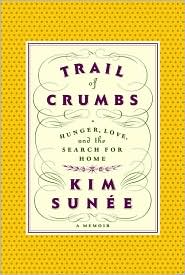Grand Central Publishing, 2008
“I leaned back and closed my eyes, ready for him to kiss me, but he filled my mouth with sweetness I had never known before, deeper than honey. I opened my eyes to a handful of fresh fat figs dripping with their own milk.”
Kim Sunée’s memoir is a fairy tale where eating and romance feed off each other. Abandoned at age three in a crowded Korean marketplace, adopted by a family in New Orleans, a place she never feels at home, except for her Poppy’s Creole kitchen, she flees to Europe during college. At twenty-two, she falls in love with a famous French industrialist, who whisks her off to live a luxurious lifestyle highlighted by entertaining and travel. Sunée’s passion for cooking allows her to slide into her role as high priestess of her lover’s kitchen in Provence, where she delights and seduces him, as well as their many guests.
On one occasion, Sunée serves an elaborate meal of melon soup, ratatouille-stuffed cabbage leaves, duck breast with raspberry-balsamic reduction, fromage blanc sorbet with candied ginger….
As I read, I yearn for the food, the companionship of the table, and the scents of lavender and thyme, the perfume of Provence. Yet here I am, alone in a woodsy New York suburb. My husband moved out ten months ago. Our two young children are with him for the week.
The subject of food has always compelled me, which is why I picked up Trail of Crumbs, to quell a gnawing hunger I can never fill. My ex tells me it’s because I am a depressive who can’t be satisfied except for brief highs, such as a good meal.
I relate to Sunée, who says of her French lover, “I want Olivier to love me until there’s nothing left. I want him to fill me whole, to drink me up until I disappear, until I am no longer discernible as a race or a gender, but just simply an empty shape that needs defining, filling in.”
I crave this level of intimacy. But Sunée becomes overpowered by Olivier, who often says, “Je veux tout t’offir” (I want to give you everything.) She leaves him to make her way back to herself. It’s a lesson in existential loneliness—even in love we are alone.
Tonight in the kitchen I want to channel Sunée and decide on ratatouille. It is August—eggplant, tomatoes, and zucchini are in abundance. Alone at the table, I tuck into the silky braise of vegetables, experiencing a serenity only good food can bring. This gratification may be fleeting, but at least I know it can be recaptured again and again with the right ingredients.
—
Stephanie Susnjara is a freelance writer and editor based in Katonah, New York. Her essays have appeared in the anthologies Women Who Eat: A New Generation on the Glory of Food(Seal Press/2003) and Our Roots are Deep with Passion: Creative Nonfiction Collects Essays by Italian American Writers (Other Press/2005), as well as other publications. She received her MFA in creative nonfiction from Goucher College in 2000 and frequently writes about food.
